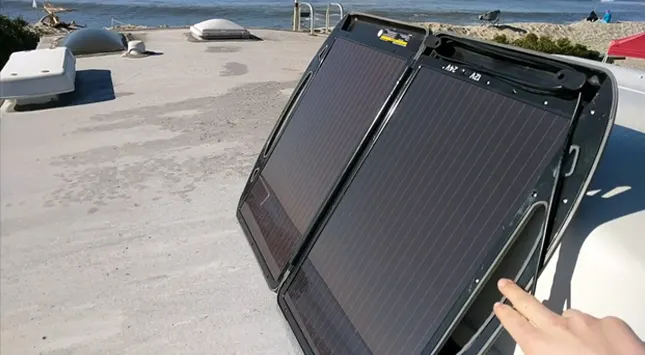Last Updated on May 4, 2023
Many people enjoy the convenience and portability of RV solar panels. They can help you charge your RV battery while you are on the go, making it possible to enjoy a camping trip or road trip without having to worry about finding a power source. But, like any piece of equipment, solar panels can sometimes have problems.
When you are boondocking in your RV, you rely on your solar panel to keep your batteries charged. If your batteries are not getting charged, it can be frustrating and leave you in the dark.
In this article, we will discuss some of the common reasons why a solar panel might not be charging an RV battery and what you can do to fix the problem.
Solar Panels Not Charging RV Battery: What To Check First?
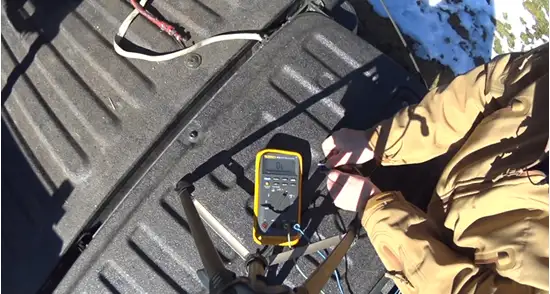
- In any situation your RV solar panel does not charge your battery, you should first check the battery’s condition. If the battery is old or has been damaged, it may no longer be able to hold a charge.
- It’s important to ensure that the solar panel’s connection to the battery is secure. If the connections are loose, they may need to be tightened or replaced.
- If you want to be certain that your solar panels are clean and clear, inspect the panels themselves. A clean, unobstructed solar panel will be much more effective at charging a battery than one that is dirty or blocked.
When your RV solar panel fails to charge your battery, these are the most basic things to check. We will dive into more complex issues in the next section.
Why is My Solar Panel Not Charging my RV Battery : Possible Problems:
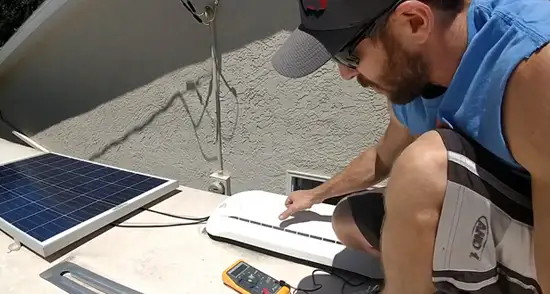
Reversed Polarity
One of the main reasons that solar panels stop supplying power to RV batteries is due to what is called “reversed polarity.” This simply means that the electrical current is flowing in the wrong direction.
Solar panels are designed to produce direct current (DC), but most RV batteries are designed for alternating current (AC). When the two are combined, the electrical current flows in the wrong direction, and the battery doesn’t charge.
if the polarity of the panels is reversed, they will actually drain the battery instead of charging it. This can be a big problem if you’re not aware of it, as it can lead to your RV being stranded without power.
It is possible to tell if your solar panels have been wired with reversed polarity. First, check the voltage at the terminal of the panel. If it’s lower than what’s printed on the panel, then the polarity is likely reversed.
Another way to check is by looking at the current meter on the charge controller. If it’s reading negative numbers, then that’s another sign that the polarity is reversed. Finally, you can also use a multimeter to check the voltage directly at the terminals of the solar panel.
If it reads positive on one terminal and negative on the other, then that means the polarity is indeed reversed. Do not panic if you discover that the polarity of your solar panels has been reversed.
It’s actually fairly easy to fix. All you need to do is disconnect the wires from the terminals and then reconnect them in reverse order.
Low Voltage
If the voltage of your solar panels is too low, it can prevent your battery from charging. The minimum voltage that a solar panel needs to produce in order to charge a 12-volt battery is about 16 volts.
If your solar panels’ voltage is lower than this, they cannot charge your battery. Several factors can result in low voltage in solar panels, including shading from trees or buildings, dirty panels, or faulty wiring.
You can try cleaning the panels and checking the wiring if you are concerned that the panels are not charging your RV battery due to low voltage.
Moving the panels to a sunny location is another option. If all else fails, you may need to invest in higher-voltage solar panels in order to keep your RV battery charged on the road.
Geographic Location
If your RV is parked in an area with little or no sunlight, then your solar panels cannot generate enough power to charge your batteries. The angle of the sun plays an important role in charging.
Solar panels will not generate as much power if the sun is low in the sky. This is why it’s important to position your panels so that they are pointing directly at the sun.
Environmental Conditions
The conditions surrounding solar panels can also affect their performance. If the weather is cloudy or foggy, your solar panels won’t absorb as much light and won’t generate as much energy.
Clouds block out the sun and prevent the solar panels from getting the full amount of sunlight they need to produce power. A very cold climate can also adversely affect the solar panels, and again, the battery may not charge.
Defective Battery
If you have a solar panel system on your RV, it’s important to make sure that the batteries are in good condition. If the batteries are damaged or defective, it can cause the solar panels to stop charging properly.
This can be a serious problem if you rely on solar power to keep your RV running. There are a few different ways that a defective battery can cause problems with the charging system.
- First, if the battery is not holding a charge, the solar panels will not be able to provide enough power to keep the RV running.
- Second, if the battery is leaking, it can damage the solar panel cells and prevent them from working properly.
- Another possibility is that the batteries are sulfated. Sulfation occurs when the lead plates inside the battery become covered with lead sulfate crystals. This can happen if the batteries are left dormant for too long or if they are frequently discharged below 50%.
- Finally, if the battery is overheating, one can expect the panel system to shut down completely.
In case your RV’s battery appears to be defective, it’s important to have it checked by a professional as soon as possible. Otherwise, you could be left stranded without power in an emergency situation.
Defective Solar Panel
As with any other device, your solar panel can also get damaged or stop working properly over time. Below are a few factors that can cause a defective solar panel.
- Open Circuit: The most common type of fault occurs when a circuit is open. This is caused by the solar cell not being able to complete the circuit, and the voltage drops to zero.
- Short Circuit: Short circuits can occur when the solar cell is exposed to too much light, causing the current to flow backward through the cell.
- Reverse Bias: Reverse biased contacts can happen when the wrong type of contact is used or when the contacts are not properly aligned.
- Diode Failure: It can happen when the diode is damaged or when it is not able to block the flow of current in one direction.
- Poor Construction Quality: Not all solar panels are created equal, and you may end up with a lower quality solar panel that cannot withstand the elements or daily use.
In most cases, you can get a replacement if it occurs within the warranty period. Otherwise, it might be time to invest in a new solar panel.
Faulty Charge Controller
One of the most important components of a solar panel system is the charge controller. This device regulates the flow of electricity from the panels to the battery, and it also prevents the battery from being overcharged.
Charge controllers can be either digital or analog, and both types can be susceptible to faults. One common problem with digital charge controllers is that they may not accurately regulate the flow of electricity, which can lead to the battery being overcharged or undercharged.
A digital charge controller can sometimes become “locked” in a certain setting, preventing it from working properly. If you suspect that your digital charge controller is not working properly, you can purchase a digital battery monitor to help troubleshoot the issue.
Analog charge controllers are less complex than digital models, but they can still experience problems. A potential problem is known as “reverse current.” This occurs when electricity flows back through the solar panel instead of into the battery, which can damage the panel and reduce its efficiency.
Troubleshooting: How to Look for the Faulty Device Yourself?
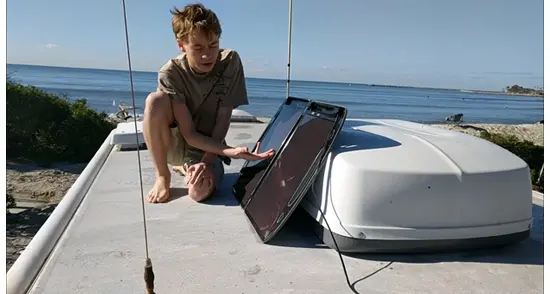
It is said that knowing is half the battle of solving a problem. So, let’s find out exactly which of your devices are responsible for not receiving any power to your RV battery.
1. Check the Solar Panel: Set the multimeter to the “DC Voltage” setting and touch the probes to the positive and negative terminals of the panel. If the panel is working as it should, you should see a reading of around 20 volts. If the reading is significantly lower than this, it is likely that the panel is faulty.
Another way to test for a faulty solar panel is to measure the resistance across the terminals. This can be done by setting the multimeter to the “resistance” setting and touching the probes to the terminals. If the reading is extremely high, it is likely that there is an open circuit within the panel.
As a final step, you can also use the multimeter to test for continuity by attaching the probes and setting the “continuity” setting. If there is continuity, you should hear a beeping sound. If there is no sound, this may indicate a break in one of the wires within the panel.
2. Check the Battery: RV batteries are essential for powering your RV, but they can go bad from time to time. Check your RV battery with a multimeter if you suspect it is faulty. Here’s how:
First, make sure that the multimeter is turned off. Then, attach the red lead to the positive end of the battery and the black lead to the negative terminal. Finally, turn on the multimeter and check the reading. If the reading is over 12 volts, then the battery is good. A reading of less than 12 volts indicates a bad battery.
3. Check the Solar Charge Controller: The first step is to disconnect the solar controller from the solar panel and the battery. Next, set the multimeter to ohms and connect one lead to the positive terminal and the other to the negative terminal of the charge controller.
If the multimeter reading is infinite, the charge controller is probably functioning properly. If there is continuity between the terminals, then the charge controller is likely defective and will need to be replaced.
It is also a good idea to check the charge controller’s fuse to make sure that it has not blown. If the answer is none of the above, it would be best to consult an experienced person to determine the cause.
How to Resolve the Problem of Solar Panels not Charging RV Batteries?
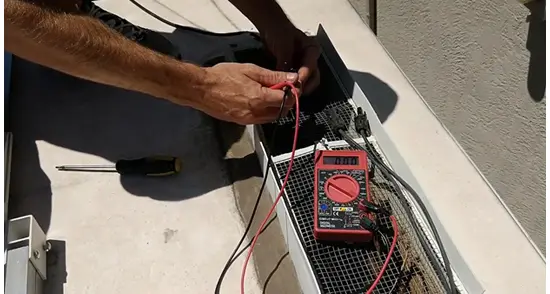
Solutions for Battery Troubles:
- Make sure that the Positive and Negative terminals are connected to the correct battery posts.
- If your batteries are sulfated, you will need to use a charging system that includes a desulfation function in order to break down the crystals and restore the batteries to full capacity.
If it cannot be repaired, you should purchase a battery that is compatible with your solar charger.
Solutions for Problematic Solar Panels:
- Verify the wiring to ensure that all of the connections are tight and free of corrosion.
- The panel should be positioned correctly. Sunlight will not be absorbed as efficiently if it is not angled correctly.
- Check the manufacturer’s instructions for specific troubleshooting steps you should follow for your particular model of solar panel
Replace the panel/panels if there are no visible or testable problems.
Solutions for Problematic Solar Charge Controllers:
If a solar charge controller stops working correctly, the first step is to check the panels and make sure that they are receiving full sunlight. If they are not, then cleaning or moving them may be necessary.
Regularly checking the connections between the panels and the charge controller is also important. The system can also be affected by loose or damaged wires.
If the problem persists, then checking the connections and replacement parts may be necessary. The entire solar charge controller may need to be replaced in some cases.
FAQs:
What’s the problem if my solar panel generates power but it doesn’t charge my RV battery?
There could be several reasons why your RV battery is not being charged by your solar panel. It is because the RV battery and solar panel are incompatible.
Another possible cause is that the wiring between the solar panel and the RV battery is loose or damaged. It is also possible that the RV battery is simply not capable of holding a charge.
How Can I Tell If My Solar Panel is Actually Working or Not?
There are a few ways that you can tell if your solar panel is working properly. One way is to look at the digital display on the panel itself. This will usually have a number that indicates how much power is being produced. If this number is zero or very low, then there is likely something wrong with the panel.
Is there anything I can do to fix my solar panel so it starts charging my RV battery?
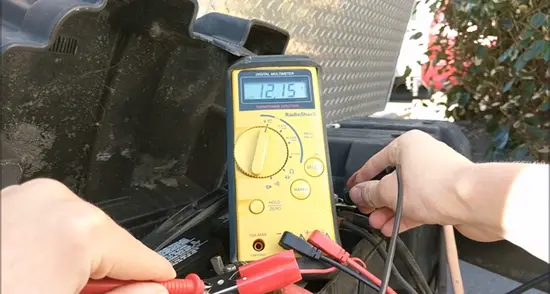
There are a few things that can be done to try and fix this issue. First, check the wiring to see if there are any loose connections. Next, make sure that the panel is clean and free of debris.
It is also crucial that the batteries are compatible with the solar panel. Finally, if all else fails, it may be necessary to replace the solar panel.
Can I Connect a Solar Panel directly to an RV battery?
Directly connecting a solar panel to a battery is dangerous, as it will continue to push charge even if the battery becomes fully charged. If left unchecked, it can ultimately damage the RV battery. A battery charge controller is necessary to charge your RV battery safely and efficiently.
Conclusion:
By now, we hope you have received an answer to the question, “why is my solar panel not charging my rv battery?”. As a rule of thumb, solar panels should be able to charge an RV battery if the weather is sunny and the panel is placed in an optimal position.
There are a number of other factors that can influence how well your solar panel charges your RV battery. These include the condition of the battery you have & the voltage and amp hours of your solar panel.
If you have any other questions about solar panels or RV batteries, please feel free to ask us in the comments below.

